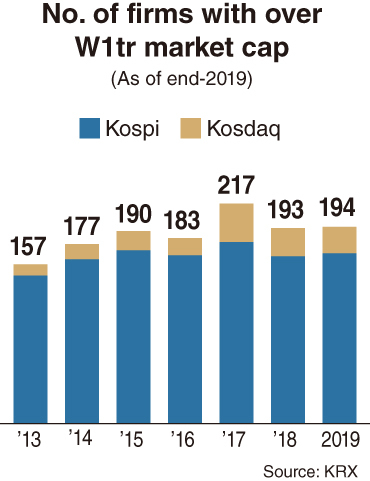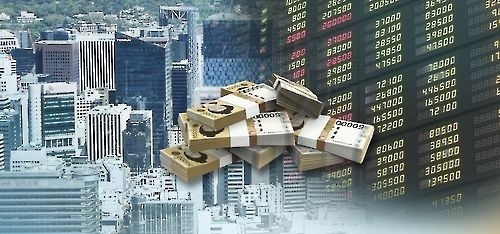Stock market adds just 1 company to ‘W1tr club’ last year
Without new listing firms, number of big caps fell
By Jie Ye-eunPublished : Jan. 8, 2020 - 16:38
The South Korean stock market saw only one listed firm join its 1 trillion won ($849 million) market capitalization club last year, reflecting the overall sluggish performance, according to the Korea Exchange on Wednesday.
The local stock market operator said in its report that there were 194 listed companies in the exclusive club at the end of last year, just one more than the previous year.
Seoul’s benchmark Kospi welcomed three new big caps, for a total of 168. The tech-laden secondary Kosdaq-listed firms fell by two to rest at 26.

However, the net number of listed companies in the club remained stable with the addition of five newly listed firms -- Hyundai Motor’s IT service provider Hyundai AutoEver, Lotte REIT, online furniture sales platform Zinus, defense solution provider Hanwha Systems and battery material maker EcoPro BM.
As of end-December, Zinus’ market cap was 1.32 trillion won. Hanwha Systems and EcoPro BM marked 1.14 trillion won and 1.09 trillion won, respectively, followed by Lotte REIT and Hyundai AutoEver with 1.06 trillion won each.
Some of the major Kospi-listed companies with over 1 trillion won market cap included the nation’s two major chipmakers, Samsung Electronics and SK hynix, marking 333.1 trillion won and 68.5 trillion won, respectively. They were followed by internet giant Naver and biopharma Samsung BioLogics with 30.7 trillion won and 25.7 trillion won, respectively.
The local stock market operator said in its report that there were 194 listed companies in the exclusive club at the end of last year, just one more than the previous year.
Seoul’s benchmark Kospi welcomed three new big caps, for a total of 168. The tech-laden secondary Kosdaq-listed firms fell by two to rest at 26.

However, the net number of listed companies in the club remained stable with the addition of five newly listed firms -- Hyundai Motor’s IT service provider Hyundai AutoEver, Lotte REIT, online furniture sales platform Zinus, defense solution provider Hanwha Systems and battery material maker EcoPro BM.
As of end-December, Zinus’ market cap was 1.32 trillion won. Hanwha Systems and EcoPro BM marked 1.14 trillion won and 1.09 trillion won, respectively, followed by Lotte REIT and Hyundai AutoEver with 1.06 trillion won each.
Some of the major Kospi-listed companies with over 1 trillion won market cap included the nation’s two major chipmakers, Samsung Electronics and SK hynix, marking 333.1 trillion won and 68.5 trillion won, respectively. They were followed by internet giant Naver and biopharma Samsung BioLogics with 30.7 trillion won and 25.7 trillion won, respectively.

Other firms listed on Kosdaq included Celltrion Healthcare, the marketing and distribution arm of Korean biosimilar maker Celltrion, valued at 7.6 trillion won. While biotech HLB marked 4.9 trillion won, CJ ENM, the operator of K-pop-oriented music channel Mnet, and game company Pearl Abyss recorded 3.5 trillion won and 2.4 trillion won, respectively.
The stock market has faced uncertainties such as the prolonged US-China trade war, local firms’ poor business performance, Japanese restrictions on key export items from Korea and the pro-democracy movement in Hong Kong.
Amid this continued sluggish performance, the Kospi index closed at 2,197.67 points, up 7.67 percent on-year, on the last trading day of last year. The Kosdaq index closed at 669.83 points, down 0.9 percent, in the given period.
By Jie Ye-eun (yeeun@heraldcorp.com)








![[Graphic News] More Koreans say they plan long-distance trips this year](http://res.heraldm.com/phpwas/restmb_idxmake.php?idx=644&simg=/content/image/2024/04/17/20240417050828_0.gif&u=)
![[KH Explains] Hyundai's full hybrid edge to pay off amid slow transition to pure EVs](http://res.heraldm.com/phpwas/restmb_idxmake.php?idx=644&simg=/content/image/2024/04/18/20240418050645_0.jpg&u=20240419100350)






![[From the Scene] Monks, Buddhists hail return of remains of Buddhas](http://res.heraldm.com/phpwas/restmb_idxmake.php?idx=652&simg=/content/image/2024/04/19/20240419050617_0.jpg&u=20240419175937)

![[KH Explains] Hyundai's full hybrid edge to pay off amid slow transition to pure EVs](http://res.heraldm.com/phpwas/restmb_idxmake.php?idx=652&simg=/content/image/2024/04/18/20240418050645_0.jpg&u=20240419100350)

![[Today’s K-pop] Illit drops debut single remix](http://res.heraldm.com/phpwas/restmb_idxmake.php?idx=642&simg=/content/image/2024/04/19/20240419050612_0.jpg&u=)